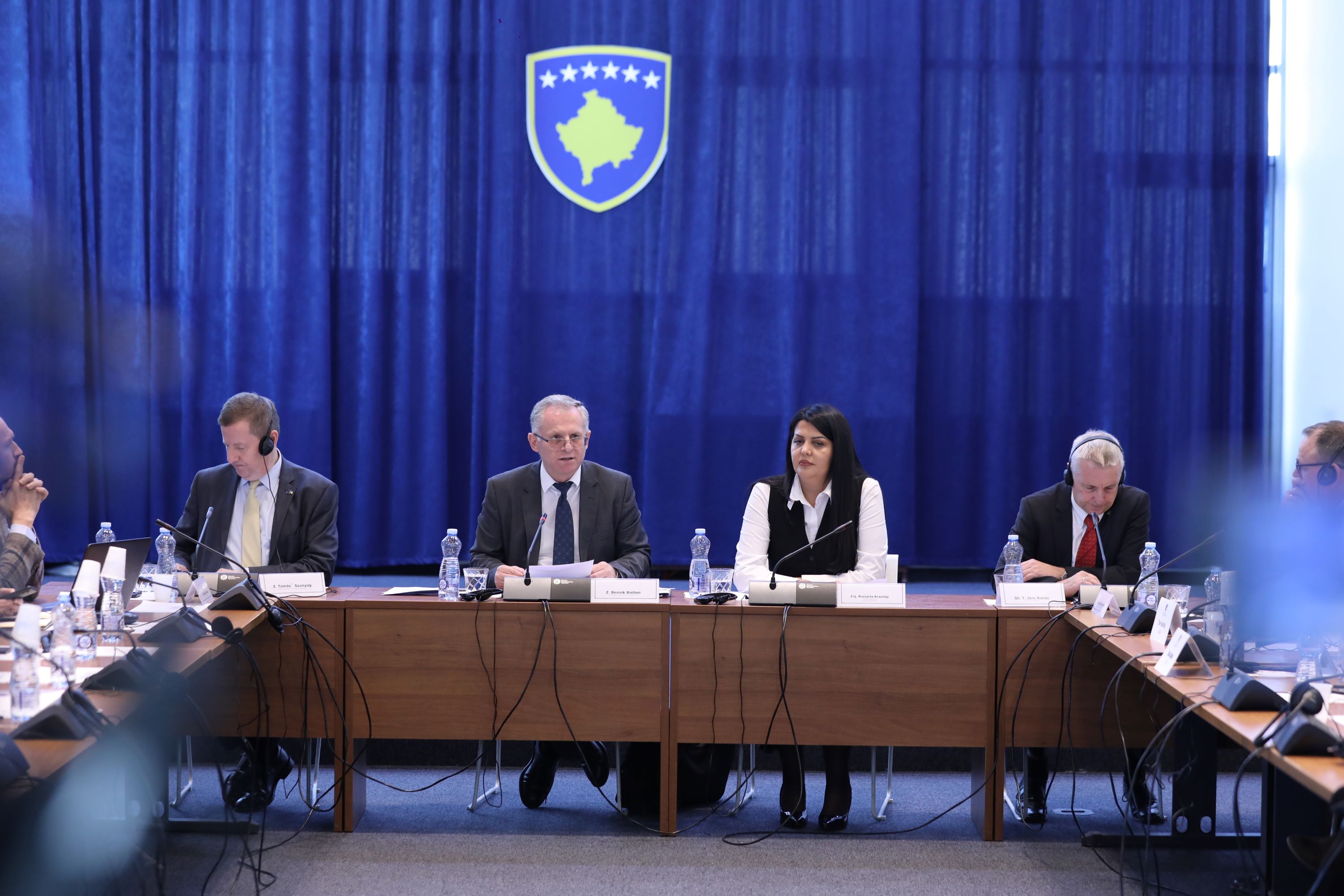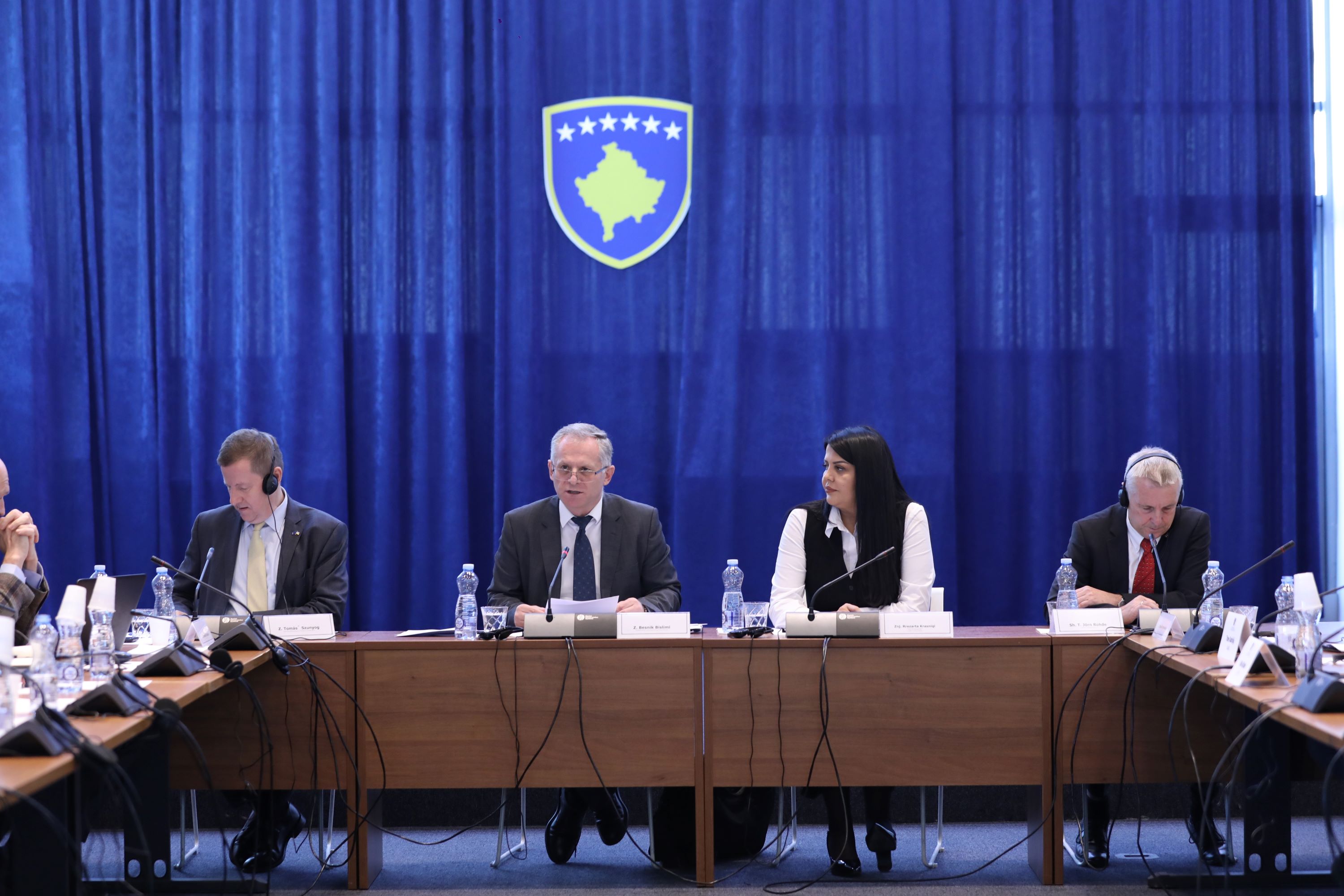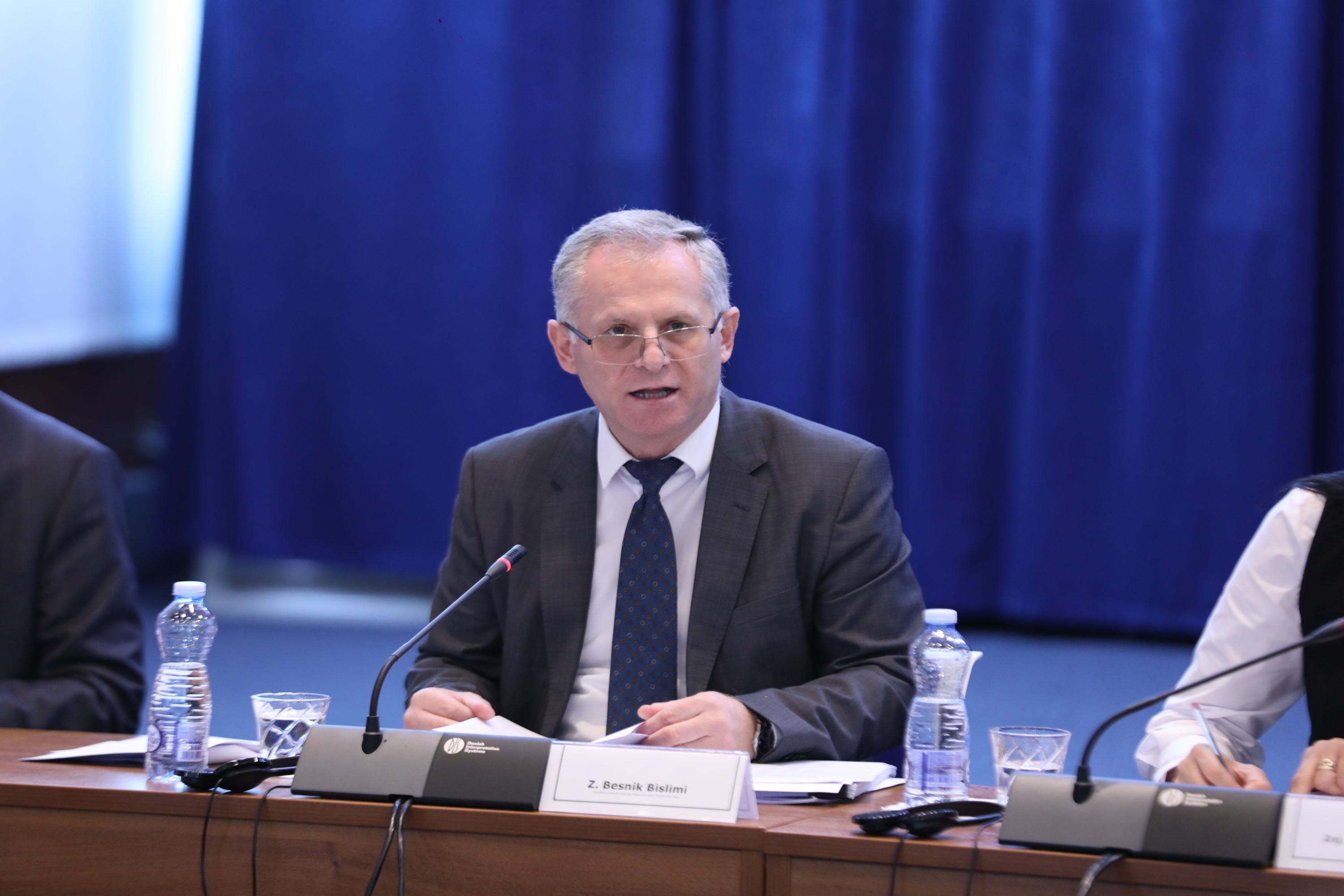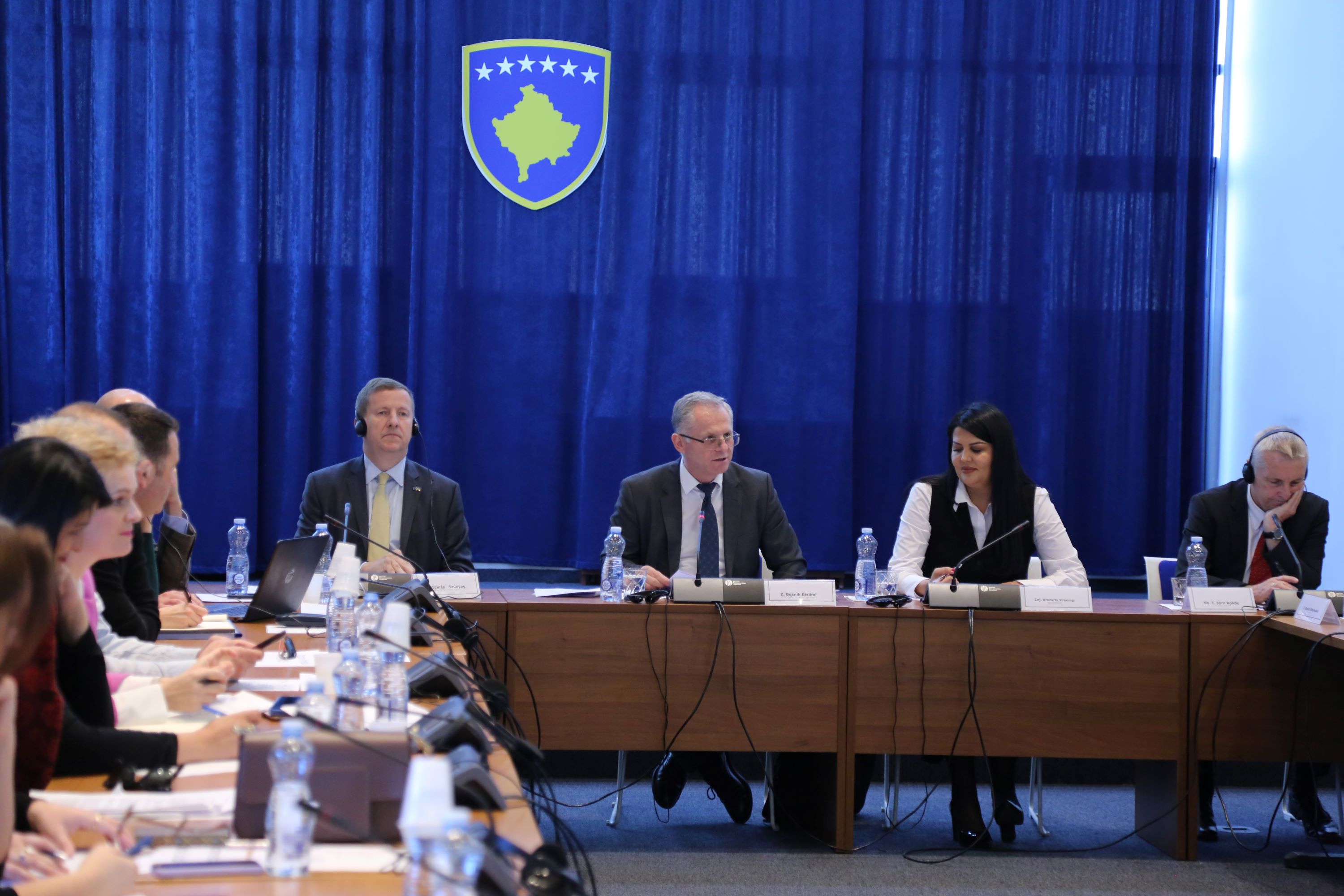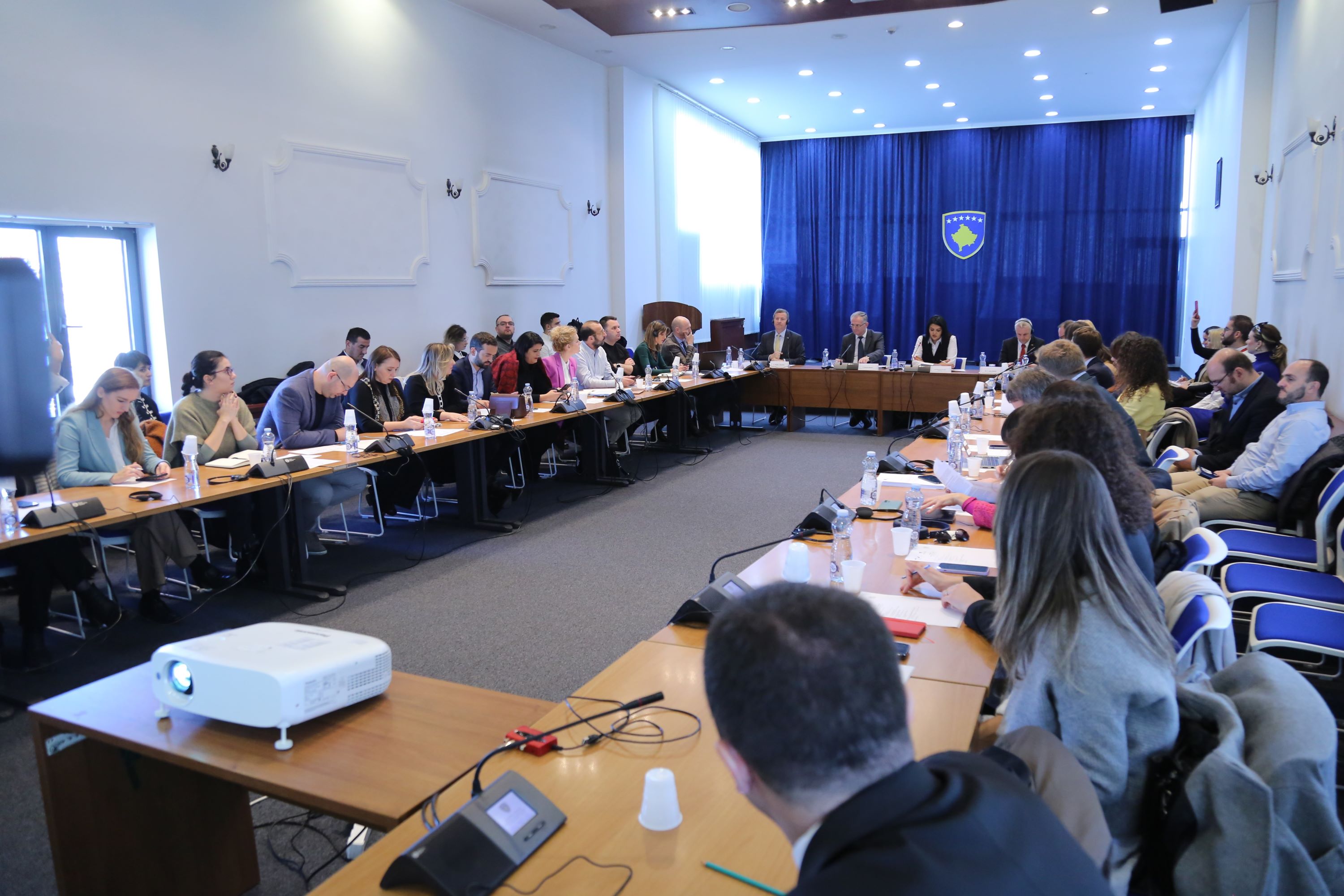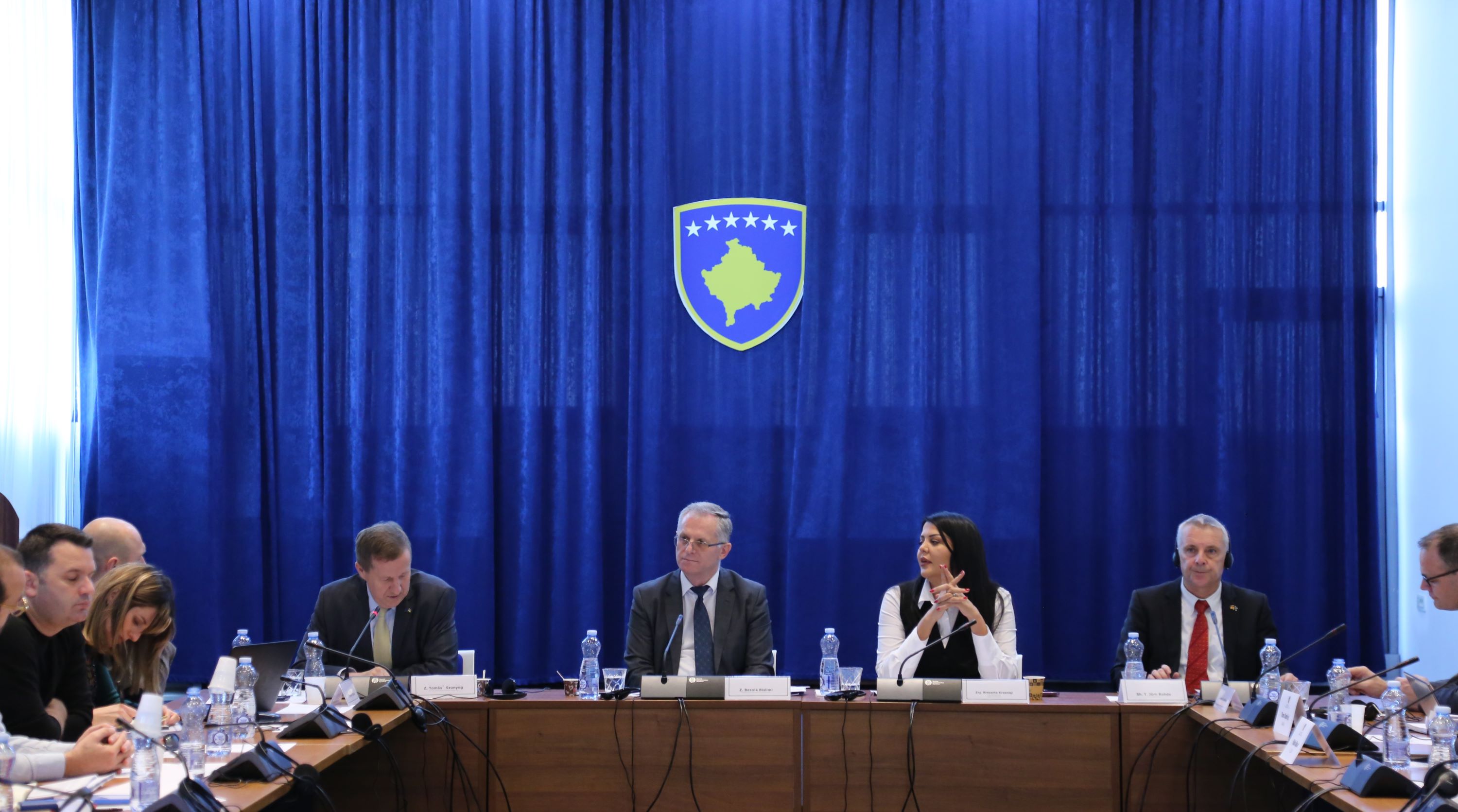Prishtina, 20 November, 2023
The first Deputy Prime Minister for European Integration, Development and Dialogue of the Republic of Kosovo, Besnik Bislimi, participated in the round table organized by the EPIK Institute, where the Country Report for 2023 was discussed.
In his speech, Deputy Prime Minister Bislimi expressed his gratitude for the opportunity to discuss openly, objectively but also critically about the Country Report for this year.
He said that this report has a positive assessment in many of the areas related to the economy, the free market, and alignment with EU standards and similar.
“The accelerated economic integration and convergence in income with the EU and within the Western Balkans fully coincides with the commitment of the Government and the progress achieved in economic criteria during this period”, he said, mentioning all the areas in which there was progress during this governing period.
At the end of his speech, thanking the participants for the conversation, Deputy Prime Minister Bislimi said that: “The enlargement package published last week brings back a hope that EU enlargement is again in the focus of attention after a decade of silence and stagnation.” We strongly support the “Growth Plan” for the Western Balkans, as we see it as a step in the right direction. The EU should be reformed and enlarged. I also strongly believe that the benefits of the EU Single Market should be linked both with economic reforms and with the advancement of democracy’.
The EU ambassador in Kosovo, Tomas Szunyog, the German ambassador in the Republic of Kosovo, Jörn Rohde, deputies and other institutional representatives, as well as representatives of civil society organizations were also present at this table.
The complete speech of Deputy Prime Minister Bislimi:
Honorable Chairperson of the Commission for European Integration, Mrs. Krasniqi,
Dear MPs of the Assembly of the Republic of Kosovo,
Dear Ambassadors Szunyog and Rohde,
Dear representatives of civil society,
Dear Director Shasha,
Thank you very much for the opportunity to discuss this year’s Country Report openly, objectively and critically.
Before I talk about the content of the Report, let me briefly touch on three elements. First, as President Krasniqi also said, for the first time the report addresses the final decision of the EU that citizens of the Republic of Kosovo can travel without visas in the Schengen area from January 1, 2024, and I think that the Government has made an excellent work with an information campaign which is still continuing and as far as I know today a step has been taken where 40 people from Kosovo who have successfully completed the knowledge quiz of the visa liberalization process have been given a free trip to Vienna on January 1st.
The second thing I want to mention is that the Enlargement Package this year proposes the opening of negotiations for Ukraine and Moldova, and candidate status for Bosnia and Herzegovina and Georgia. As the Government of the Republic of Kosovo, we welcome this decision and see it as an important reflection of the EU in what we see as the geostrategic importance of accelerating the expansion of the EU, both with the countries of the Western Balkans and with the countries of others bordering Russia. But I want to emphasize that at this stage, Kosovo not only does not have open negotiations for membership in the EU, but also does not have the statute of the candidate country, and has not even received the questionnaire from the Commission.
As Kosovo, we believe that there is no technical problem for Kosovo to be granted the status of a candidate country, and for this status there is no need to have full recognition from all EU member states. Delays in handling Kosovo’s application are greatly weakening the EU’s position in Kosovo and increasing the skepticism towards the EU among Kosovo’s citizens.
The third one that I think is very important, when we talk about the content, has to do with the facts that the negative measures of the European Commission against Kosovo are still in force and we believe that the presence of these measures to some extent had an impact on the evaluation that was done to Kosovo in the report and that in some cases it was largely subjective and they did not evaluate the reforms that took place on the ground. Also, the measures that are in force conflict with the region’s effort for accelerated integration in the EU, especially with recent initiatives such as the Growth Plan and the one for the Single Market. Therefore, it is very important that the EU withdraw these measures as soon as possible, so that the focus returns to the advancement of the European integration of our country.
As for the Country Report, let me start with the statement made by Mr. Shasha that there is positive growth in the report. For example, there is a positive assessment in many of the areas related to the economy, free market, and alignment with EU standards and similar.
Accelerated economic integration and convergence in income with the EU but also within the Western Balkans fully coincides with the commitment of the Government and the progress achieved in economic criteria during this period, such as:
• In the field of competition and economic growth, especially in the field of customs, taxes, social and employment policies, education and culture, as well as energy, we have made progress.
• Good progress has also been achieved in the field of alignment with the internal market, where 16 laws and 35 bylaws have been approved that are within the requirements stemming from the SAA.
• Increase in budget revenues by nearly 14%
• Successful formalization of the economy and jobs
• Increase of 88% on an annual basis of foreign direct investments
• Significant reduction in the level of public debt
• Progress in the management of public projects
• Increase in the export of goods and services and increase in the degree of openness of the economy
• Increase in the registration of new businesses that coincides with the increase in the difference between open and closed businesses
• Stable financial sector against the crises we face
• Improvement of the business environment
• Success in the digital transformation of the economy
• Improvement in the free movement of goods, services and capital
Also, the report recognizes the achievements in the field of Energy, both in projects and in the field of legislation:
• Approval of the energy strategy 2022 – 2031
• Greater security in energy supply
• Increase in investments for renewable energy
• We are in the phase of almost completing the first solar auction for 100 MW of energy
• We have very successfully implemented energy efficiency measures in public and residential buildings, subsidizing over 10,000 families for the purchase of efficient equipment.
But there are also areas where the assessment made in the progress report is not in line with the Government’s beliefs. The most important part where we have substantial disagreements with what is seen in the report is about the reform of the public administration. The report says that there is no progress in the reform of the public administration, an assessment that we see as more or less not serious, let me document this with the Government’s achievements in the field of public administration reform.
We have adopted a number of essential and quality documents from this field. For example, the strategy for public administration has been approved, and its implementation has started since January 2023. Reporting and monitoring is provided through an online platform, which is fully functional. We have approved the strategy for e-government and the Law on cyber security.
We have approved and started the implementation of two crucial laws, such as the Law on Public Officials and the Law on Salaries in the Public Sector. We have approved the Program for the Prevention and Reduction of Administrative Burden 2022-2027, a program designed to address regulatory and administrative obstacles that hinder economic development and has resulted in the simplification of 44 permits and licenses for economic operators.
As part of the digitization of services for citizens, over 150 public-administrative services at the central and local level have been launched on the e-Kosova platform, which means an increase of 700% compared to last year. And at this time, the e-Kosova platform has over 800,000 subscribers, including citizens, businesses and NGOs. Now tell me in which year, until now since 2008, we have had more activities, strategies and important laws within the framework of public administration reform to come to the conclusion that there has been no progress. While in other countries of the Western Balkans with much less legislative actions and strategies, the conclusion of the report for those countries is significantly more positive.
As for foreign relations, the criticism of the EU remains on the unaccepted protocols of Kosovo, which is a political issue of Kosovo’s representation. I think that reducing the entire foreign policy to two CEFTA protocols is not serious and shows that there is a discrepancy between the developments on the ground and what is said in the Country Report.
On the rule of law, the assessment of the Country Report contradicts other indices of the rule of law that are made according to “Transparency International”, where Kosovo is ranked 84th, and performs better than most of the candidate countries for accession to the EU but also in “V-Dem”, where it ranks 70th out of 179 countries. If you allow me to briefly mention, for example, the rule of law, the report states that we are in the middle of the early stage and we have some preparation or level of preparation, while in international reports such as the World Justice Project, Kosovo is ranked better than Bulgaria, which is a member of the EU, it is ranked 40 places better than Hungary, which is a member state of the EU, and it is ranked 35 places higher than Serbia, which is that there is “some level of preparation” in this context.
There are also other reports, for example in the fight against corruption, where Kosovo is better than all other candidate countries, for example it is 32 countries better than Ukraine for which negotiations are being opened, this shows that more or less there is a dissolution of large gap between the situation on the ground and how this is reflected in the Country Report.
The criticism remains on the lack of final verdicts in the courts, and here the Government has started two very important processes, such as the vetting process and that of the Bureau for Confiscation, which remain suspended by the Constitutional Court. Regarding the Government’s obligations in the Rule of Law, let me mention some of the achievements:
The adoption of the strategy until the end of 2022, namely the Strategy for the Rule of Law, has achieved 43% of this strategy. Currently, 45% of the measures have been evaluated, while only 12% of the measures within the Rule of Law strategy have not yet been implemented. 88% of measures fully implemented or under implementation, it is wrong to say that there is a slow pace of strategy implementation. We have established the Commercial Court, and such courts are not established and staggered every year. We have made progress in administrative justice. We have the new Draft Law on Administrative Conflicts which aims to make the procedures more efficient, we have the new Law on Probation Service and we have the new Law on the State Prosecutor. These are not few achievements for only one year of operation.
To conclude, the enlargement package published last week brings back a hope that EU enlargement is back in focus after a decade of silence and stagnation. We strongly support the “Growth Plan” for the Western Balkans, as we see it as a step in the right direction. The EU should be reformed and enlarged. I also strongly believe that the benefits of the EU Single Market should be linked both with economic reforms but also with the advancement of democracy. Those who do not represent the values of the EU should not benefit from funds from the EU, and together we must continue to work towards increasing stability both economically and meetings like this are a very good opportunity for the exchange of our experiences.
Thank you very much once again for the opportunity to discuss this topic together today.
Last modified: November 21, 2023
